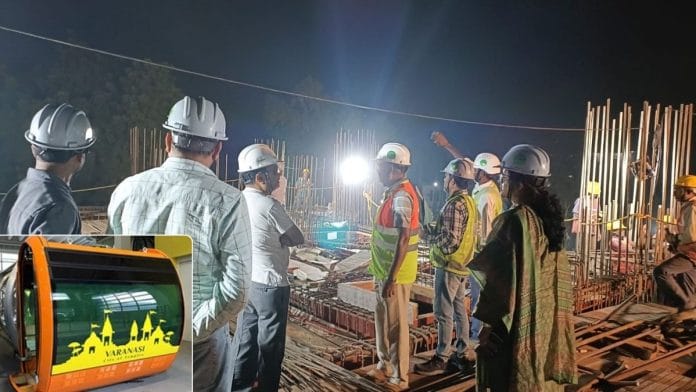New Delhi: The Supreme Court has put on hold further construction on part of the ropeway facility in Varanasi that aims to improve accessibility to key destinations in the city, including the Kashi Vishwanath temple and Dashashwamedh Ghat.
On 18 February, a bench of Justices M.M. Sundresh and Sanjay Karol issued a “status quo” order in response to a petition filed by three women whose shops situated at the popular Dashashwamedh Ghat were demolished by authorities in Uttar Pradesh without any notice or compensation to acquire land for construction in the ropeway project.
While directing the Uttar Pradesh government to respond to the petition, the bench fixed 14 April to further hear the matter. “In the meantime, the parties shall maintain status quo as on date,” the SC ordered, giving interim protection to the petitioners.
The petitioners—Mansha Singh, Suchitra Singh and Pratima Singh—approached the Supreme Court after the Allahabad High Court declined to protect their respective properties, even as a final decision in their petition questioning the “illegal demolition” of the shops was pending before the HC.
On 20 January, 2025, the Allahabad HC had agreed to hear the matter and issued a notice to the state. Despite observing in its order that the demolition exercise carried out was illegal and arbitrary, the HC did not restrain state authorities from undertaking further “illegal construction”.
Advocate Rohit Amit Sthalekar, who argued the case in the SC on behalf of the three women, told ThePrint that the demolition was unconstitutional and against the rule of law. “The properties in question are freehold. The state could not have pulled them down without giving an opportunity to hear the owners,” he said.
“The HC’s failure to protect my clients virtually rendered their petition infructuous as the construction work continued over the site where the properties were located. It’s an irreparable loss caused to my clients.”
Also Read: Modi wants Paris look for Varanasi, but residents say city identity ‘under attack from BJP’
‘Constitutional rights violated’
The ambitious ropeway project in Varanasi is touted to be India’s first public transport ropeway and the world’s third. It will cover a distance of 4.2 km, connecting the Varanasi railway station to Church Square or the Godowlia Chowk.
The ropeway is expected to improve accessibility to key destinations in Kashi, including the temple and the Dashashwamedh Ghat, where the morning and evening ganga prayers attract thousands of tourists. Once functional, it is also expected to reduce traffic congestion in the city, enabling devotees and tourists to reach the significant sites with ease.
The three women who approached the top court against the state’s alleged “illegal” demolition action owned five shops at the Dashashwamedh Ghat and, per their contention, the market price of the shops was worth Rs 15 crore. They were demolished in the “most arbitrary manner,” without any written notice served to them, they said in their appeal before the Supreme Court.
According to them the demolition action has deprived them legal possession of their properties, a right under Article 300A of the Constitution. Moreover, it was also a violation of Article 14 (right to equality) and Article 21 (right to life, live with dignity and personal liberty).
‘Due process not followed’
Under the current legal framework, the government can take over a private property only after initiating acquisition proceedings under the Right to Fair Compensation and Transparency in Land Acquisition, Rehabilitation and Resettlement Act, 2013 (RFCTLARR Act, D 2013).
According to the law, the government can acquire private land for a public project, such as the construction of roads. However, the 2013 law entails a procedure, which any government authority that intends to acquire private property must follow.
Under this procedure, the government first has to issue a public notice declaring the proposed move to take over the property, and then initiate proceedings to compensate its original owner.
The land acquisition law enables an owner to question the acquisition, in case due process is not followed, as well as the compensation calculated by the acquiring government agency.
In the present case, the petitioners asserted that no proceedings were held under the 2013 law. Besides, the local state authorities did not even hold private negotiation with the owners and, instead, forcibly acquired their property.
The petition quoted several Supreme Court judgments in its support and to criticise the HC’s denial of an interim relief to the three women.
These past verdicts, the petitioners argued, have dealt with the importance of interim protection, which must be given to ensure the main case does not become either infructuous or a “fait accompli” before the matter is finally heard and decided.
Interim relief, they said, is in the “interest of justice” and in the present case it would have saved the property owners from incurring an irreparable loss.
SC judgments that have deprecated the unfair procedure adopted to deprive individuals of their immovable property too have been relied upon.
(Edited by Sanya Mathur)
Also Read: Penalty for misconduct in House must be proportionate & just, says SC. Sets down guidelines







Supreme Court has nothing better to do?
It does not have time for critical cases such as Election Commission appointment procedure. But it has all the time in the world for such tomfoolery and buffoonery.
The Supreme Court always has ample time for such idiotic and frivolous complaints. But when it comes to serious issues like the RG Kar case or the teacher’s appointment scam of Bengal, it’s just too busy.